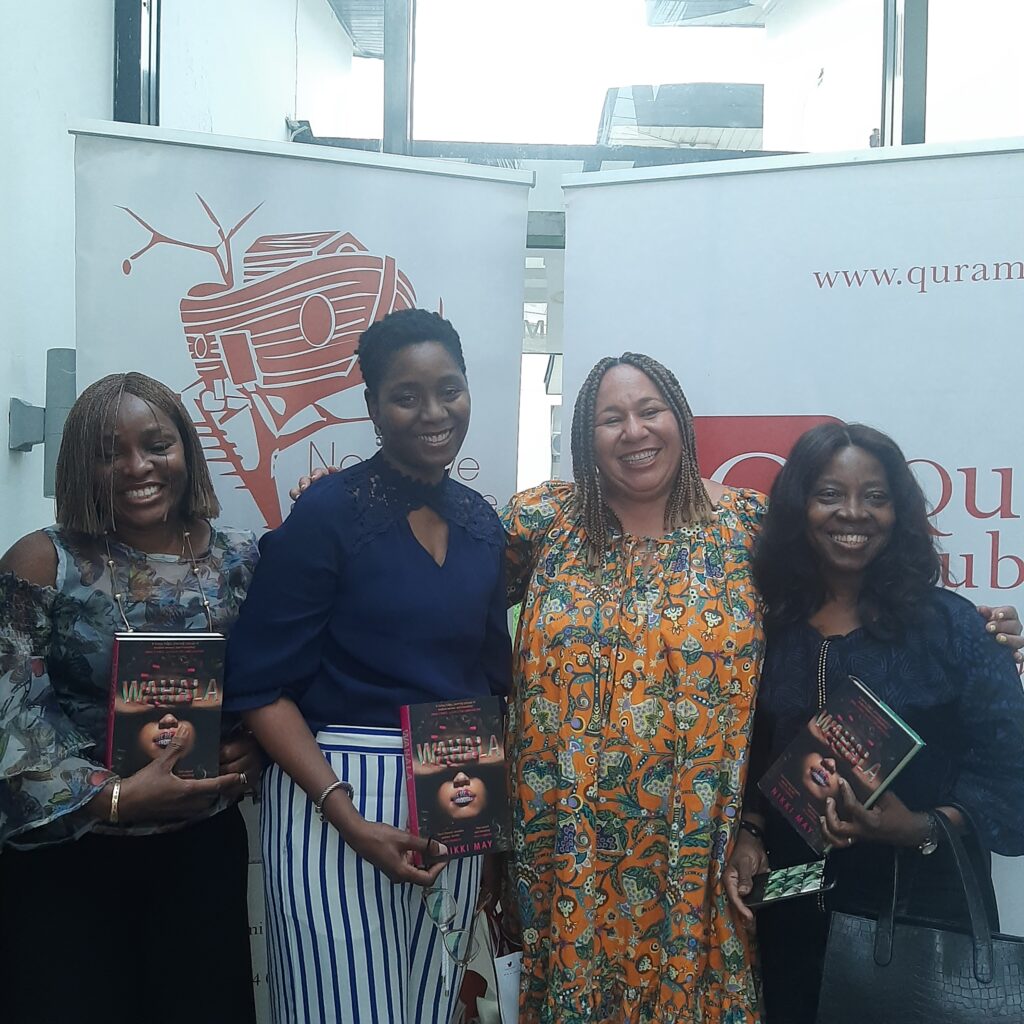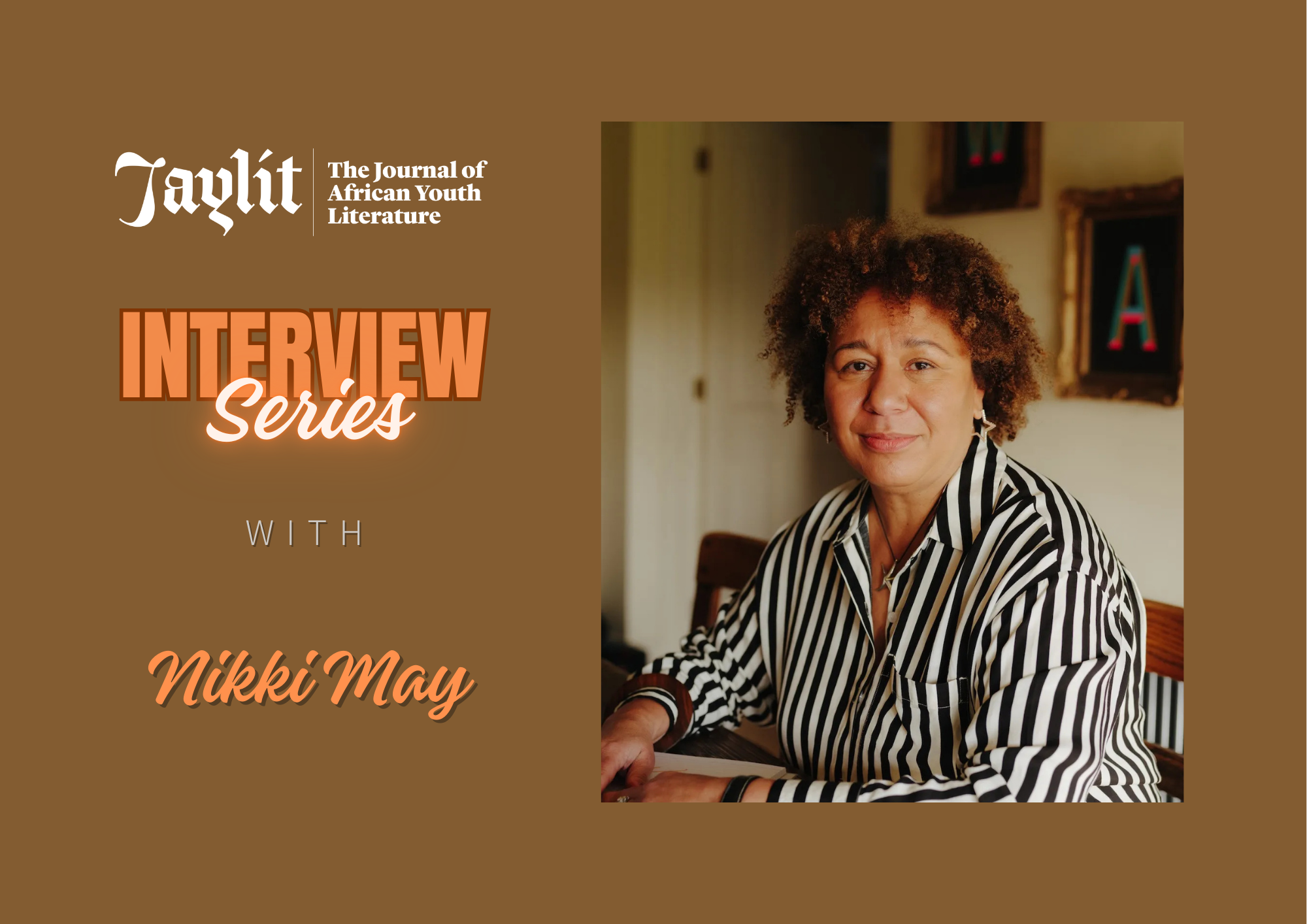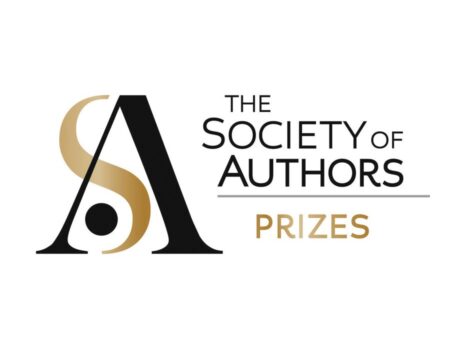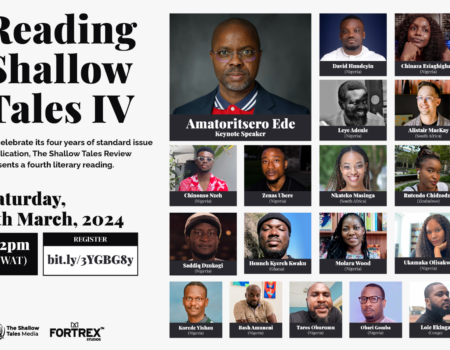Born in Bristol and raised in Lagos, Nikki May is Anglo-Nigerian. Her critically acclaimed debut novel, Wahala, won the Comedy Women In Print New Voice Prize, was longlisted for the Goldsboro Glass Bell Award and the Diverse Books Award, and is being turned into a major BBC TV drama series. Nikki lives in Dorset with her husband, two standard Schnauzers, and way too many books. This Motherless Land is her second novel.
In this interview, Nikki talks to Ibrahim Babátúndé Ibrahim about her debut, Wahala, her sophomore, This Motherless Land, the perks and challenges of being biracial, her inspiration and process as a writer, African writers to watch, and much more. Please come along for a truly fun read!
~
IBRAHIM
Welcome, Nikki! It’s a pleasure to be starting our interview series for 2025 with you. I understand you used to run a PR agency before transitioning into writing. How would you say that contributes to your craft as a writer?
NIKKI
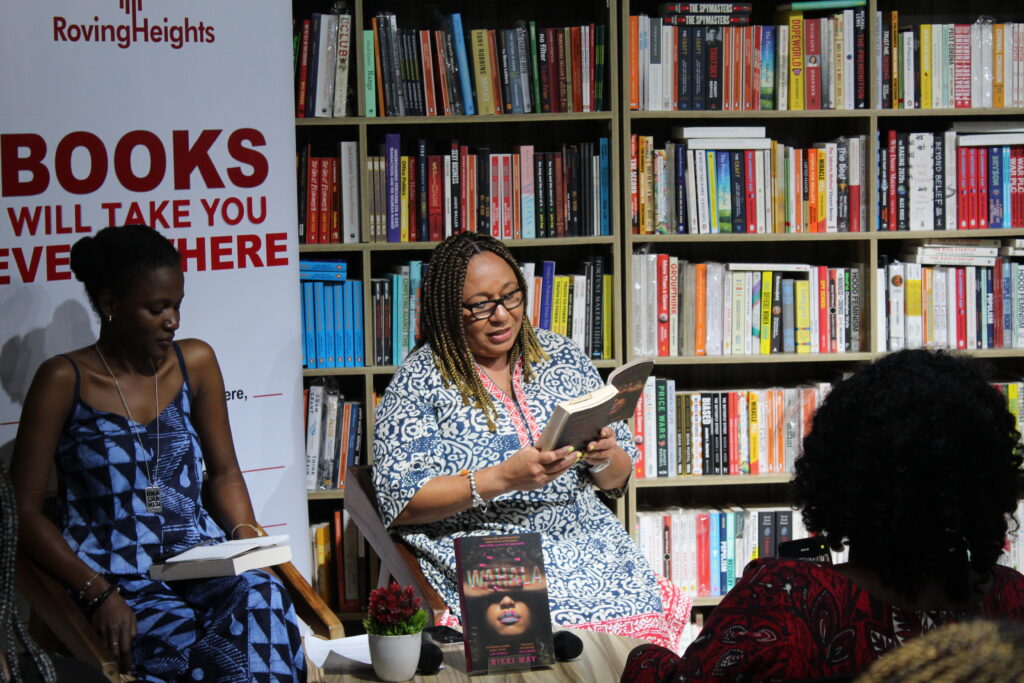
Hi Ibrahim, it’s a joy to be here, thanks so much for having me. My career in advertising was definitely helpful, although I didn’t know it at the time, it was the perfect training ground. I learned to be creative, to understand my audience, and to use storytelling when creating content. But I think the biggest lesson was not to take criticism personally and to accept being edited. There is nothing that can’t be made better and having an open mind and a desire to produce good work is essential. I was lucky enough to work with a team of brilliant people so I’m used to digging deep and pushing myself. To write something worth reading, you need to be passionate and care deeply. My life in advertising taught me A LOT.
IBRAHIM
But why writing? Was this something you’ve always wanted to do or it’s something you just stumbled on? Give us some background.
NIKKI
My love of writing started with reading. I’ve read a book a week since I was ten, I cannot imagine life without a book on the go. Reading has got me through some tough times, books have taught me, educated me, amused me, infuriated me, and inspired me. Being a novelist has always been my dream job but it didn’t occur to me that it could be a reality until my late twenties when I read Waiting To Exhale by Terry McMillian. It was a real ‘A-ha’ moment. A book about black women I could identify with – I felt seen! But a blank page is a frightening concept and it took another thirty for me to start on my first book.
IBRAHIM
As you must know, there are a lot of barriers, gatekeeping, and things like that with writing, especially for underrepresented writers. What would you say changed everything for you? I mean, at what point did you feel like it’s clicked and you’re finally going to be an author?
NIKKI
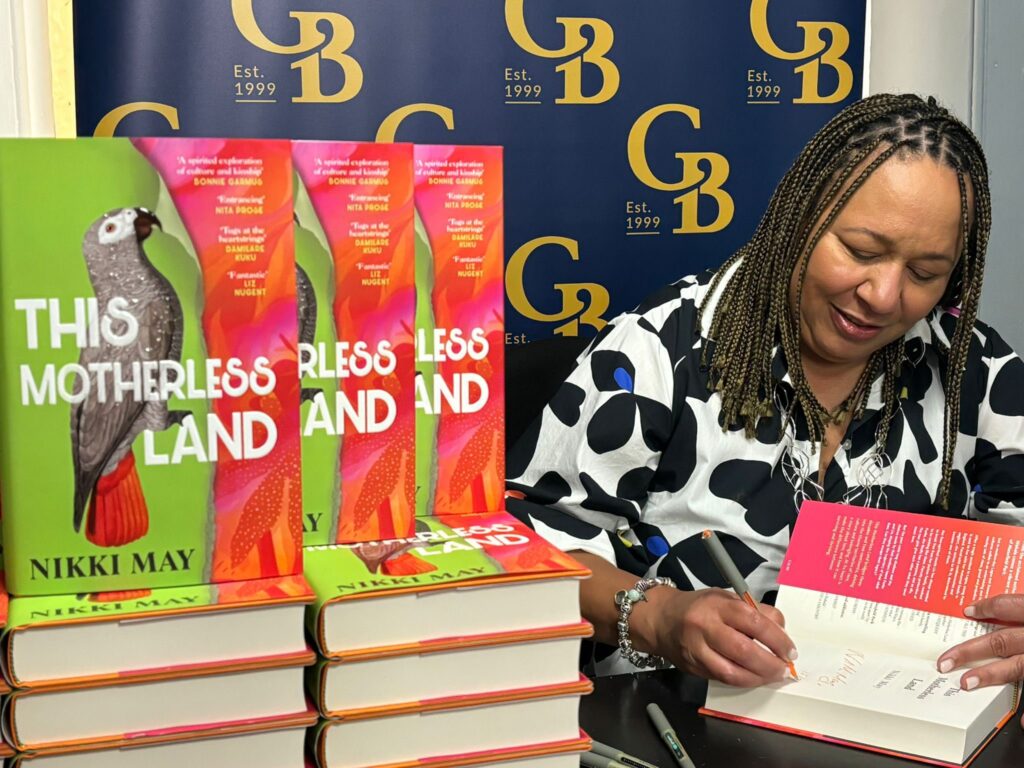
My biggest barrier was self-doubt. I’m my own worst critic and although I come across as super confident, I’ve suffered from imposter syndrome most of my life. Now that I’ve become friends with many brilliant authors, I realise this is very common – perhaps it’s an essential character trait! BUT – and this is where it gets weird – to write a book, you need to be incredibly arrogant. It takes immense confidence to believe what you have to say is worth reading. And, that arrogance – the certainty that your story has to be told – needs to be bigger than the self-doubt. It took me a l-o-n-g time to get the balance right.
Yes, there are lots of obstacles. Writing is hard, getting an agent is hard, getting a book deal is hard and selling lots of books is hard. But once the idea for Wahala came to me, I didn’t think about the barriers, I just felt compelled to write it.
IBRAHIM
Talking about your debut, Wahala. It did a great job introducing you to the world. Among other things, it won the Comedy Women in Print New Voice Prize and is presently being adapted into a TV series by the BBC. Tell us more about it.
NIKKI
It’s been an incredible journey! Wahala went to a nine-way auction in the UK, a six-way auction in the USA, and before the book was published, the screen rights were snapped up by the BBC. It’s dream-come-true stuff. It seems incomprehensible that two years ago I was unpublished and now I have two books out in the world (both being adapted for TV) and a few prize nods too. Wahala showed up on a few prize lists and This Motherless Land has just been shortlisted for the Edward Stanford Travel Book Award 2025. But when people say I’m an overnight success, I laugh because it’s far from true. My success was fifty-eight years in the making – everything I’ve done and all my lived experiences brought me to this place.
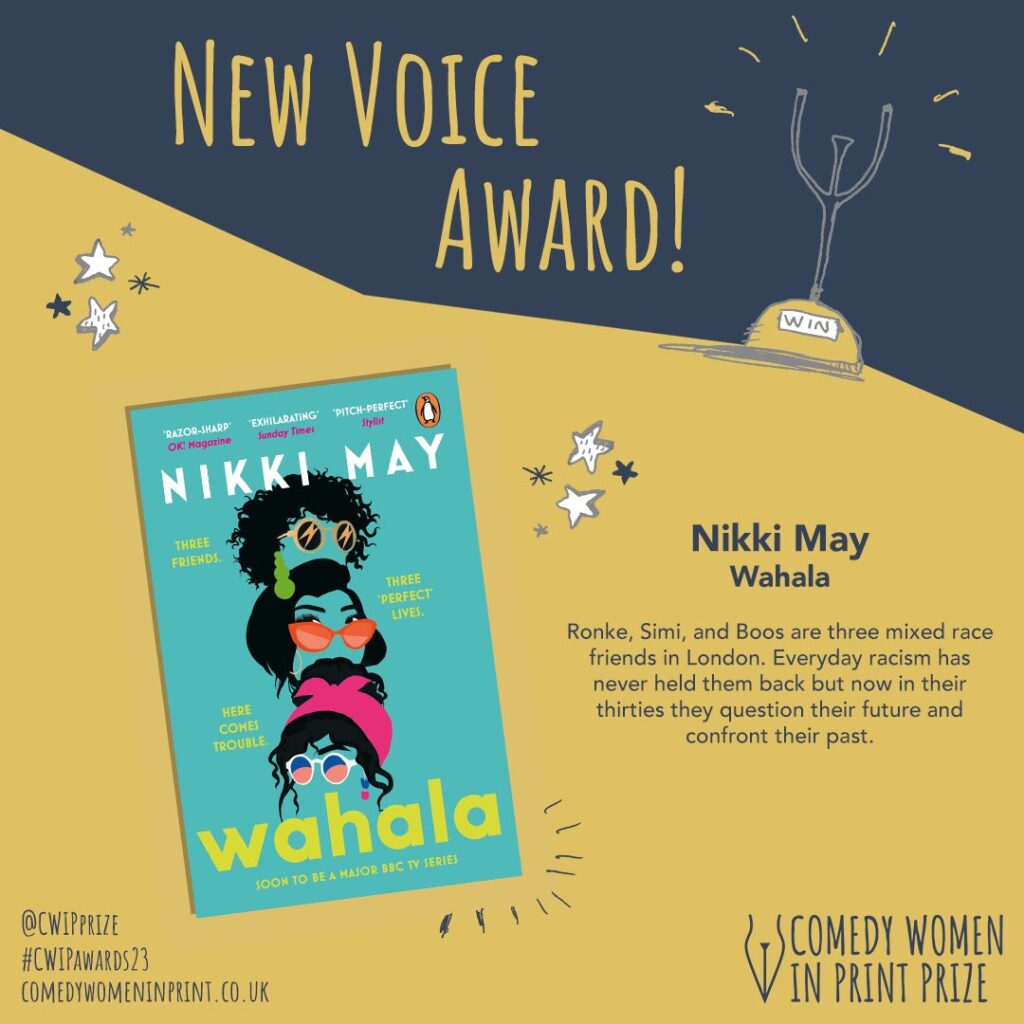
The Wahala TV series is being produced by Liz Kilgarriff at Firebird Pictures – she did Bodyguard, Luther, and Poldark – who is a genius. The book has been adapted by Theresa Ikoko who was BAFTA-nominated for Rocks. I’m lucky to be in such safe hands. I can’t say more at this stage but it’s going into pre-production soon, so watch this space. I’m an Executive Producer for both adaptations and I cannot wait to be on set. I’m determined to get myself on screen as an extra! Why not?
IBRAHIM
Why the name Wahala, of all the names in the world? (Laughs) Tell us why you settled for that, and are you one of those writers who believe the title is just as important as the content?
NIKKI
Titles are notoriously difficult to get right. This Motherless Land started off as Brown Girl in the Ring and went through about ten name changes before we got the right one. But Wahala was Wahala from the get-go – there was never any doubt. For starters, it’s a brilliant word and deserves to be in everyone’s vocabulary. And secondly, it’s just so apt – Isobel brings the wahala and my book is full of trouble! I was a bit worried that my publishers would want me to change the name but they loved it too. And the TV team are the same. So hopefully, I’ll get my wish, and the word ‘wahala’ will be on everyone’s lips.
IBRAHIM
I read somewhere that it was inspired by a lunch date you had with friends, yes?
NIKKI
Yes, this is true – I think the best ideas come when you are relaxed and not trying too hard Every couple of months, me and my “Naija girls” (we still call ourselves that, though we haven’t been girls for many decades) meet for lunch at a Nigerian restaurant in London. We are there for hours – eating pounded yam, suya, and moin-moin; drinking Mateus Rosé (which is what our parents used to drink in Lagos); and gisting. There is something wonderful about having shared history with friends – you don’t need to explain yourself, you know they have your back. These lunches are very important to me and it was on the way home after a particularly long and loud session that the idea for Wahala popped into my head. I sketched out the first scene on the train and finished the first draft in six months.
IBRAHIM
Clearly, you’re inspired by your environment and the things that go on around you. What else would you say inspires you as a writer?
NIKKI
A lifetime spent code-switching between my two cultures has made me slightly obsessed with identity – it’s at the heart of both my books and will definitely show up in book three. And female friendships fascinate me too. Being a woman is a complicated thing – the world pushes and tugs at us. There are expectations on our hair, our bodies, our careers, our relationship status, and even our reproductive organs. So of course we have a lot to talk about – which is why my women go for a lot of lunches.
I write fiction but my biggest source of inspiration is my life. I can only write authentically about things I know so I draw on my own lived experiences. My next book is set in an advertising agency, very similar to the one I worked at. I guess the wahala will start when I run out of experiences to exploit!
IBRAHIM
Let’s talk about your process. Are you a pantser or a planner? Do you just go with the flow, or you’re one of those writers who plot and plan meticulously?
NIKKI
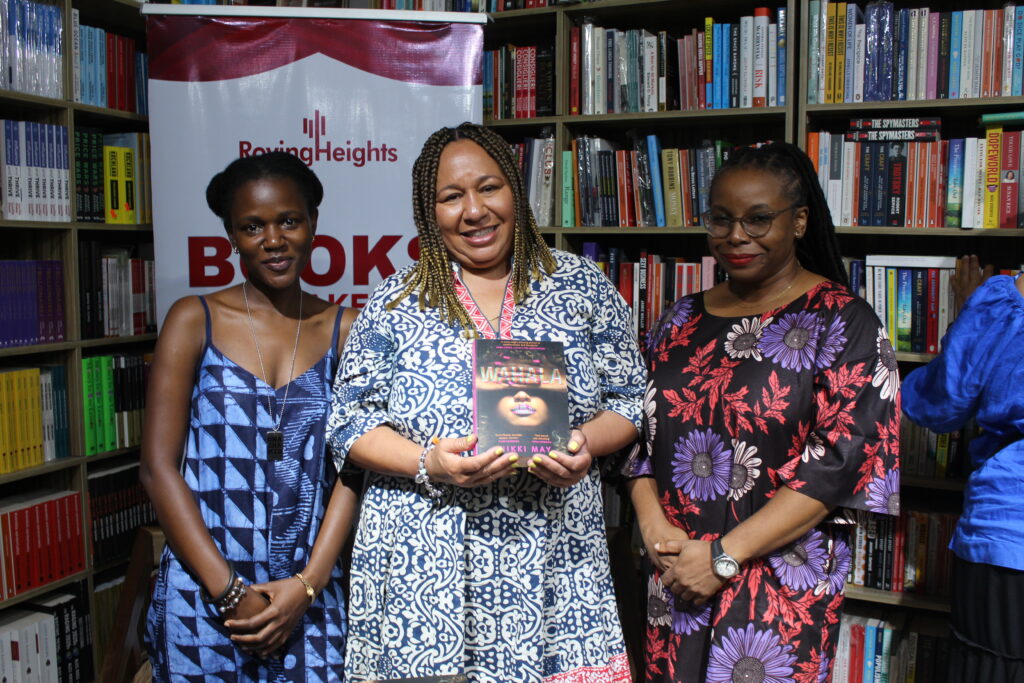
Both! I have to know – and love – my characters before I can write them. I spend a lot of time working them out, getting under their skin, discovering what makes them tick and how they would behave in any given situation. I can’t expect readers to care about them unless I care about them. It takes a long time but at some point, they suddenly become ‘real’ and that’s when it’s time for me to start writing.
Unfortunately, characters have minds of their own and don’t always do what I want them to. So despite all my careful planning, my first draft always lands hundreds of miles away from where I intended! The way I see it, my first draft is me telling myself the story. Once I know what the story is, I work out the best way to tell it to my readers. It’s a process and it doesn’t get easier!
IBRAHIM
You were born in the UK, and then spent some of your formative years in Nigeria. How well grounded would you say this makes your sense of place while writing about these places?
NIKKI
I was born in England but made in Lagos – and I wouldn’t have it any other way. I moved to Nigeria before my second birthday, went to Corona School, Queens College, and then The University of Lagos – where I freaked my father out by dropping out of medical school (it took him years to forgive me). I can write authentically about Nigeria because I am Nigerian, it is my home. And I can write authentically about England because I am English, it is my home. Two homes is twice the joy.
IBRAHIM
Wahala is set in London, but a Nigerian would also read and feel like you’re telling a Nigerian story. You are Anglo-Nigerian, of course. How would you say having both the UK and Nigeria to call home has influenced your writing, content-wise, culturally too?
NIKKI
Being mixed-race is a mixed-bag – sometimes my sense of identity is concrete, other times it’s elusive. But I wouldn’t change one thing about my life – it’s given me so many stories to tell, I’m just getting started! Having a foot in both camps allows me to see the good and the bad in both my homes. These things are nuanced, like me, they are not black or white.
IBRAHIM
Not like there should be any, but permit me to ask if there any barriers, or downsides as a result of this multiplicity – dual identity? Perhaps mentally too?
NIKKI
Oh yes – there are downsides! I’ve been accused of being ‘too black’ and accused of being ‘too white’. Just as often, I’m accused of ‘not being black enough’ or ‘not being white enough’. It’s very frustrating. People make huge assumptions – they think they know what you are by what you look like. I have to remind people that melanin is not a character trait. Turns out it is possible to belong to two places and also belong nowhere. It’s taken me a lifetime to realize I’m not half, I’m both.
IBRAHIM
Let’s talk about This Motherless Land, your new one which has been shortlisted for the Edward Stanford Travel Book Award 2025. What’s the inspiration behind it?
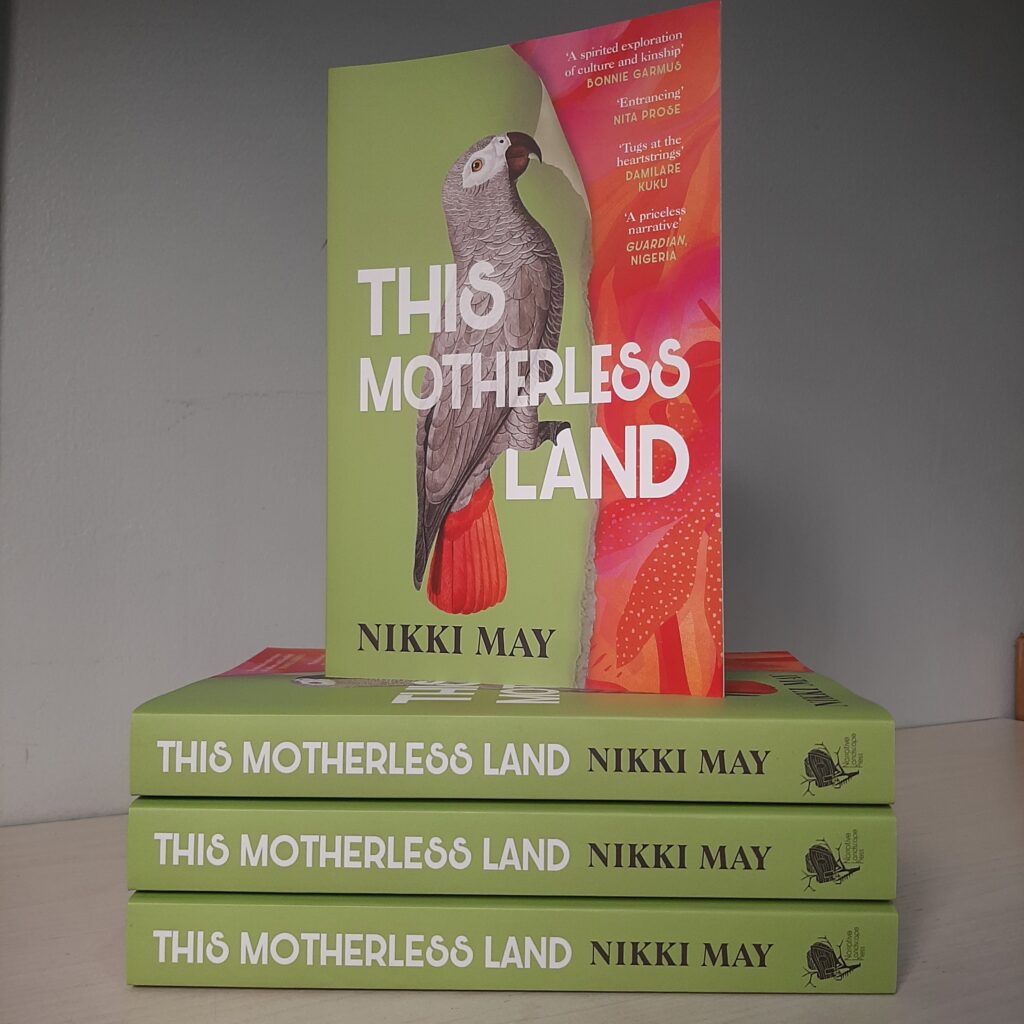
NIKKI
I’ve always known I’d write about identity and belonging one day, but re-reading Jane Austen’s Mansfield Park was my “Aha!” moment. The idea of a girl being ripped away from everything she knows and dropped into an alien environment where she needs to prove herself, over and over, is genius. So I stole it!
But This Motherless Land is a reimagining, not a retelling. I used Mansfield Park as scaffolding and built a different story around it. It’s a very personal story about belonging and how you can twist yourself out of shape to fit in but still fail. When we meet Funke in 1978, she’s living my happy middle-class childhood in my house in Lagos with Billy, my sister’s African Grey parrot. She goes to my school, spends weekends on my beach, and rides my green Chopper round the quiet campus streets with her little brother, just like I did. She reads Enid Blyton and thinks that’s what England is like – she’s in for a big shock.
Like Mansfield Park, my book is a love story, just not the romantic kind. There’s something compelling about mirrored lives, so I set out to compare and contrast Funke and Liv on the basis of simple binaries: black vs white; rich vs poor, introvert vs extrovert, conformist vs rebel, good mother vs bad mother.
I had such a good time mocking the irrationality and ridiculousness of prejudice in both my homes. And I loved writing about my two cultures – they are very different, but humans are the same everywhere, we seem determined to find disparity and then exploit it.
IBRAHIM
Clearly, Wahala has set some very high standards for you as a writer. Where do you see This Motherless Land in a year?
NIKKI
I hope it makes people laugh, gasp and cry. If it makes a few people question their privilege and/or prejudice, that will be a bonus. So far, I’m overjoyed with how it’s going. It was selected as a “Read with Jenna” pick in the US which is a bit like winning the book lottery. I got to go on The Today Show live from Rockefeller Centre in New York and talk about my book to two million viewers. It’s already been shortlisted for a prestigious prize and I’ve had incredible meetings with the team adapting it for TV.
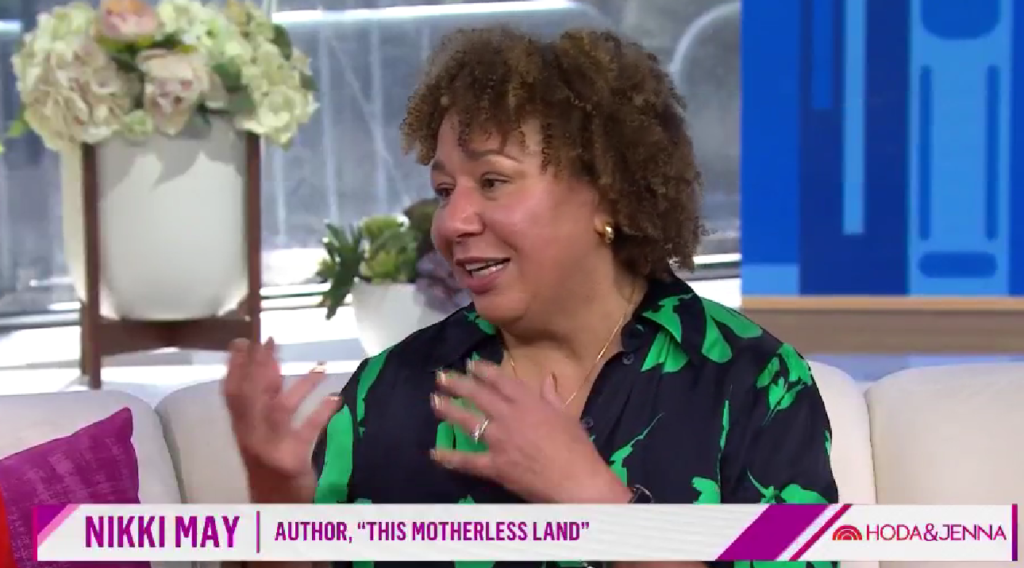
IBRAHIM
What are you working on at the moment? What should your readers be looking forward to?
NIKKI
I’m busy working on the terrible first draft of my next novel. I don’t like talking about my books until they are finished in case I jinx them – but I can tell you it’s set in an advertising agency and has three strong, but flawed female characters.
IBRAHIM
Writing is a lonely business, but not very much when you have a community of other writers, an agent, some editors, etc. What would you say has been the singular most important spurring-on factor in your writing? What motivates you and drives you to keep going?
NIKKI
I couldn’t have done any of this without my husband, Peter. We’ve worked together for over thirty years and he is my head of plot and first editor He also has immense belief in my writing and buoys me up when the dreaded self-doubt descends. I get all the glory but Peter does half the work. My characters spur me on too – they are like real people walking around in my head. Right now, my book three characters keep talking to me – I have to tell their story!
IBRAHIM
Do you have any plans of going back to PR or it’s primarily writing for you from here onwards?
NIKKI
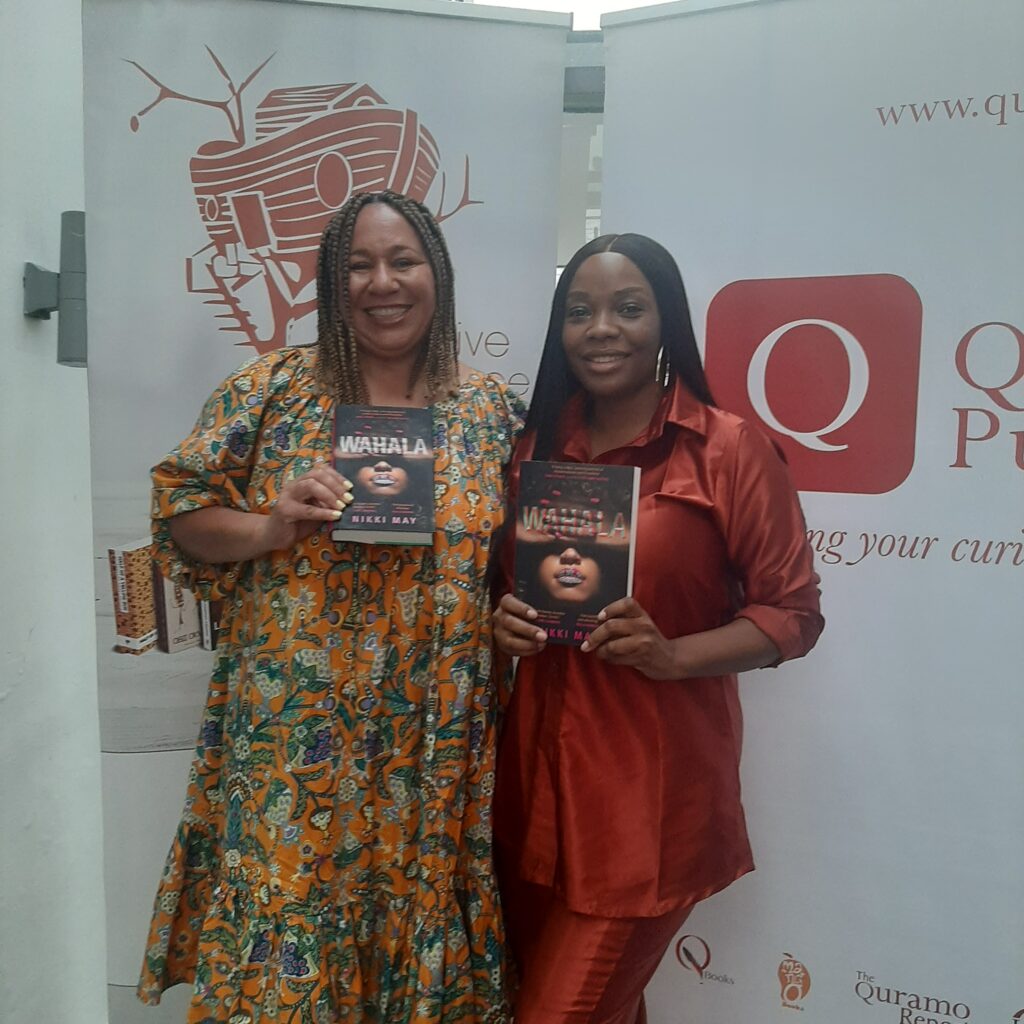
My advertising days are definitely behind me. My passport now says ‘author’ in the profession box. There’s no turning back now!
IBRAHIM
It says in your bio that you live with “…way too many books”. Who are some authors (or what are some titles) that you absolutely love and have learned from?
NIKKI
So many! Chimamanda Ngozi Adiche is a queen, I can’t wait for her new book. I love Ayobami Adebayo’s writing, I had the honour of interviewing her last year – a career highlight. I’ve read everything Liane Moriarty has ever written. I grew up reading Agatha Christie and I credit her with teaching me the basics of plot construction. I discovered Elin Hilderbrand recently and I’m racing through her back catalogue.
IBRAHIM
What is the best writing advice you’ve ever gotten? Something you wish you had known earlier when starting out as a writer?
NIKKI
Just do it! You can’t edit a blank page so put the words down. And read. Reading taught me how to write.
IBRAHIM
If you weren’t writing or doing PR, in an alternate world that is, what other things could you have found fulfilment in? Surprise us please (laughs)
NIKKI
I would love to have been a professional tennis player. I see myself at Wimbledon, serving aces, running around the court in a little white skirt, holding my trophy aloft – a Nigerian Serena Williams. Unfortunately, I cannot run, I have zero hand-to-eye coordination, and on the few occasions I’ve played tennis, my serves don’t go over the net – so this is a fantasy that will never be realised.
IBRAHIM
(Laughs) Are there any young African writers who are impressing you at the moment? Someone you’d recommend for us to look out for. They don’t have to be known. We could be meeting them for the first time through you.
NIKKI
Damilare Kuku is a rising star – I loved Nearly All The Men In Lagos are Mad and Only Big Bumbum Matters Tomorrow. I will read anything she writes. Foluso Agbaje is one to watch – her debut The Parlour Wife is very accomplished. And I’m looking forward to reading more by Ekemini Pius, his short story, “Daughters, By Our Hands”, is original and clever.
IBRAHIM
Thank you very much for your time and honesty.
NIKKI
Thank you so much for the opportunity and for asking such great questions! It’s been fun.
